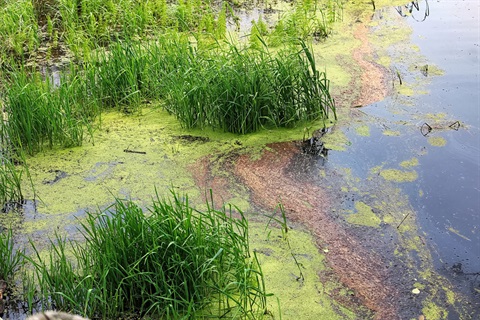Blue-green algae in our waterways

Blue-green algae are naturally occurring bacteria found in rivers, creeks and dams. Warm weather and still water create the perfect conditions for them to grow quickly. Some types produce toxins that can be harmful to people, pets, livestock, and wildlife.
Blue-green algae blooms may:
- appear as foam, scum, mats, or paint-like streaks on the water’s surface
- change the water colour to green, blue, brown, red or other shades
- sometimes not be visible at all.
How it's detected
Permanent signage is installed at some waterbodies that frequently experience blooms during warmer months, such as Yarrambat Lake.
Temporary signs may also be placed at other local sites when blue-green algae are detected.
Council will share warnings on its website and social media to keep the community updated.
Treatment
Blue-green algae can’t simply be removed. Chemicals that kill algae also harm fish, plants and other aquatic life, so they cannot be used in natural waterways.
If the water looks clear
You can’t always see blue-green algae. Even when water looks fine, high levels may still be present. If the water looks unusual, or if you’re unsure, it’s safest to stay out.
Health risks
Exposure to blue-green algae may cause:
- skin rashes or irritation
- sore eyes, ears or nose
- asthma symptoms
- numb lips or tingling fingers and toes
- nausea, vomiting or diarrhoea.
Seek medical advice straight away if you develop any of these symptoms.
Common questions
Does boiling make the water safe?
No. Boiling bursts the algae cells and releases more toxins.
Is fishing safe?
Avoid eating fish, shellfish, yabbies or crayfish from affected areas. Take care not to touch or swallow water when fishing or boating.
Is it safe for pets and livestock?
No. Pets and livestock should never swim in or drink from water affected by blue-green algae. It can be extremely dangerous for them.
Find out more
Visit the Better Health Channel for more information.
Council is currently developing a Blue-green Algae Risk Management Plan.